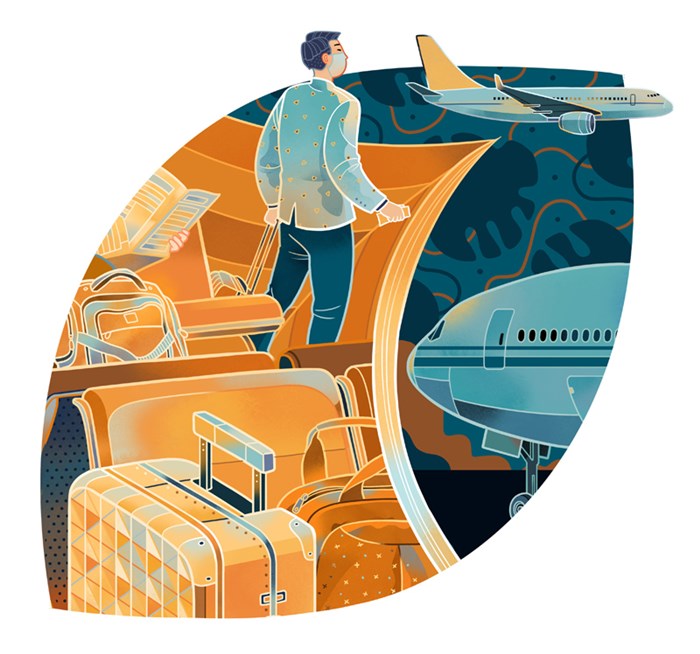Aviation sector must embrace green recovery
Song Chen/ China Daily
Climate change poses a serious threat to humankind, and the threat is increasing by the day thanks to continuous rise in emissions of greenhouse gases such as carbon dioxide. CO2 emissions, which mainly come from burning fuels, especially fossil fuels, have accounted for 80 percent of global warming since 1990, according to the World Meteorological Organization.
Among the major industries contributing to CO2 emissions is aviation. Until 2017, the total annual global passenger volume was about 4 billion, and the aviation industry accounted for 2.5 percent of the total CO2 emissions in 2018 and the annual emission growth since 2010 was 4-5 percent, according to Our World in Data. Incidentally, CO2 is the largest component of emissions from aircraft, accounting for about 70 percent of the total exhaust.
These facts show how important it is to control CO2 emissions, and to ensure the aviation industry takes the path of sustainable development by striking the right balance among environmental protection, social responsibility and earning profits.
The COVID-19 pandemic has impacted all sectors of the economy worldwide, including the aviation industry. The restrictions on the movement of people as part of the overall pandemic prevention and control measures and the consequent slump in the number of travelers worldwide have dealt a big blow to the aviation sector.
This poses a big challenge for the domestic aviation market as well. For instance, Beijing Daxing International Airport has witnessed a sharp drop in the number of passengers-between 20,000 and 30,000 passengers per day in January 2021 against the peak of about 100,000 before the pandemic. And according to Eurocontrol, European airlines can expect their number of flights to reach the 2019 level only by 2026. Which means both the global and domestic aviation industries are in for a long haul.
Yet the pandemic has also provided an opportunity for the aviation industry to pursue green recovery, and turn adversity into opportunity by transitioning to eco-friendly business. For example, funds for research on exploring alternative sources of energy such as electricity, hydrogen and hybrid energy should be increased, as the use of less-polluting fuel by the aviation industry will reduce the emission of greenhouse gases.
Since economic activities across the world are expected to rebound strongly after the pandemic is controlled, it is important to plan ahead for the sustainable development of the aviation industry.
First, concerted global efforts are needed to reduce CO2 emissions. Since environmental protection and climate mitigation are common global responsibilities, all countries should jointly shoulder them. Given the damage the pandemic has done to the global economy, it is necessary that all countries strengthen cooperation in healthcare, science and environmental protection to repair the damage.
To this end, the UN's International Civil Aviation Organization introduced a program called Carbon Offset and Reduction Scheme for International Aviation in January to offset the rise in global CO2 emissions above the 2019 levels. According to CORSIA, airlines must buy credits to offset the emissions from their aircraft, and then can use these "offsets" to fund climate-friendly projects such as planting trees or installing solar panels. The program, which currently is voluntary, will apply to all ICAO member states after 2027.
A few weeks ago, climate leaders worldwide took a major step forward at the Climate Ambitious Summit under the framework of the Paris Agreement. Even though climate mitigation in the aviation sector is not mentioned in the Paris climate accord, many participants pointed out the necessity of the aviation industry's transition to eco-friendly business. For instance, UN Secretary-General Antonio Guterres said aviation as a core carbon-emitting sector, along with many other industries, should present and implement new, transformational road maps in line with the climate mitigation goals.
Second, countries should shoulder differentiated responsibilities and assume different roles in global efforts to protect the environment, because developed regions contribute more to global emissions. For example, North America led global aviation emissions in 2019 releasing an estimated 293 million metric tons of CO2 equivalent into the atmosphere according to Bloomberg. And in the United States, flights contribute 12 percent of the emissions among all industries.
So it would be unfair to force those less-developed countries, whose aviation sectors contribute negligible amounts to global aviation emissions, to share equal mitigation responsibilities. In other words, "big" and developed countries should shoulder more responsibilities in reducing emissions.
And third, it is important to effectively manage the air part and ground part of the aviation industry's mitigation efforts to achieve CO2 reduction targets, for which strong cooperation among governments, airlines, airport companies, and air traffic control authorities is needed to, for instance, introduce greener flight procedures. Other necessary measures include reducing waste, eliminating single-use plastic, and replacing printed tickets by e-tickets.
The aviation industry has helped reduce distances and brought the world closer, but it has also caused damage to the environment. The world has reached a turning point where the health of the environment will decide the future of humankind. It's time all industries and all sections of society worldwide collaborated closely to overcome the environmental challenge and the aviation sector embraced the green path of recovery in the post-COVID-19 era.
Writing by Yan Fawei and Wang Yisheng (Yan Fawei works at the Beijing Daxing International Airport, Capital Airport Holding Company, and Wang Yisheng is a civil servant working in a regional environmental protection authority in Beijing); editing by Wang Jingzhong